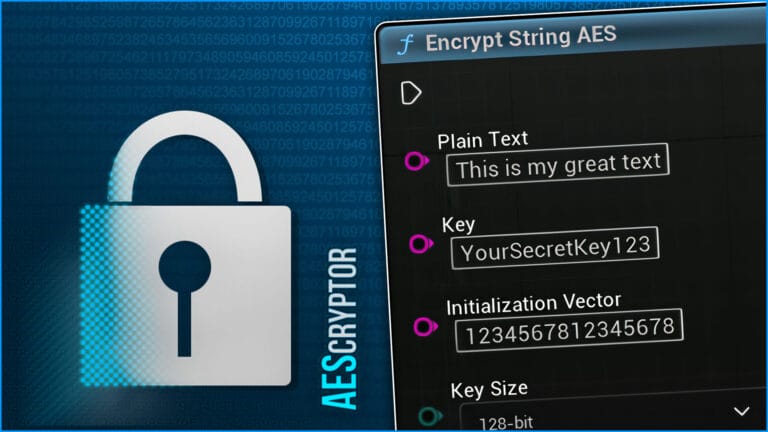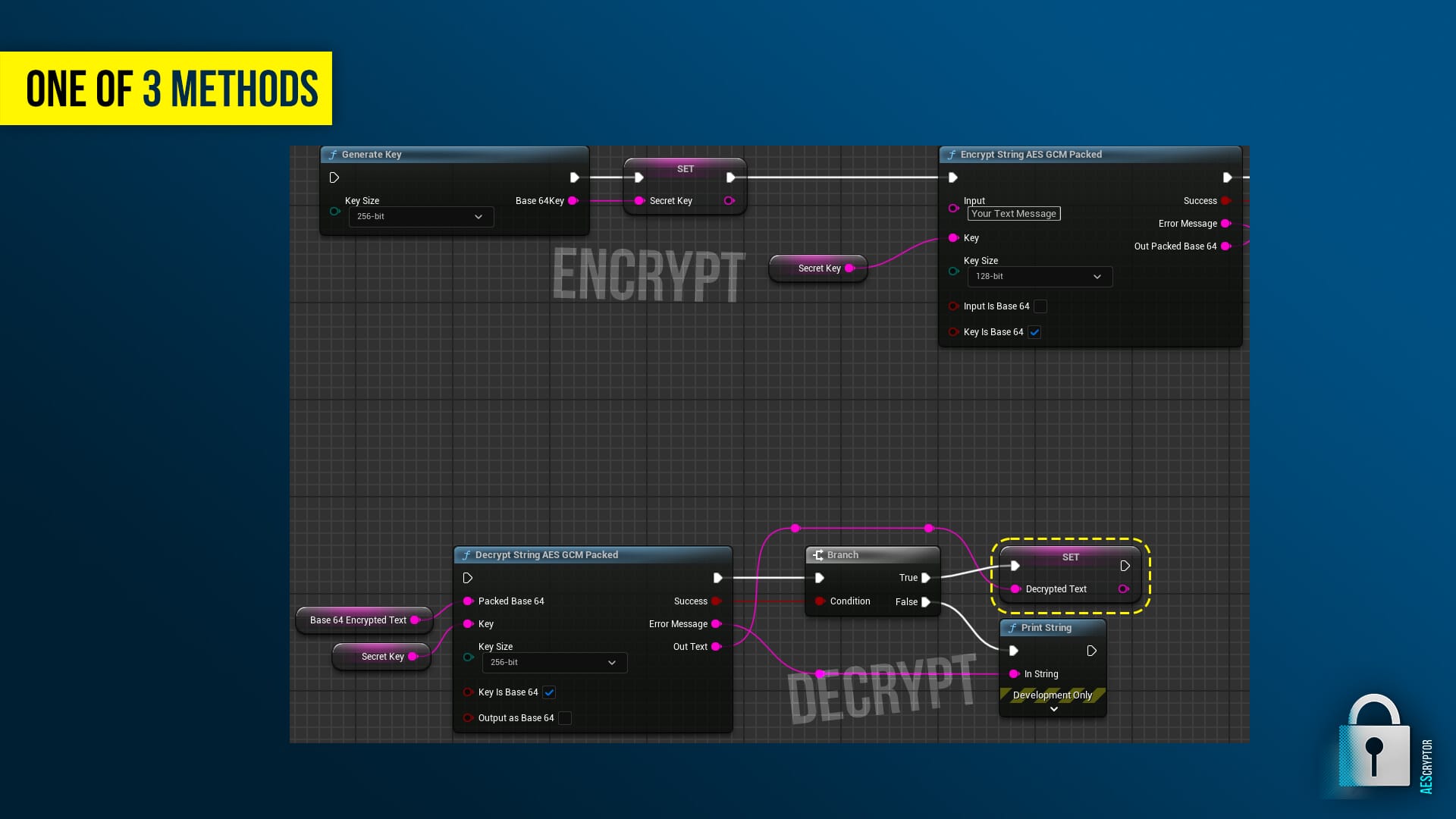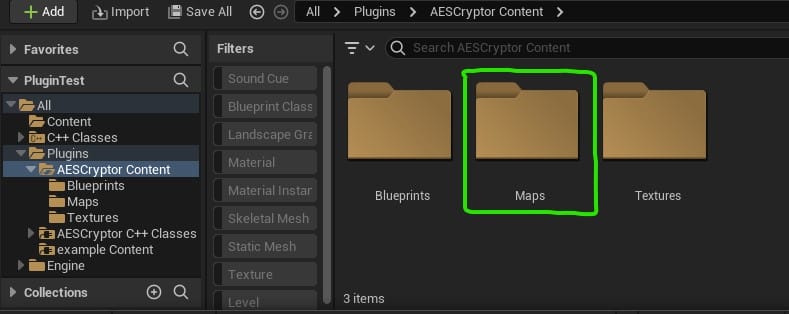Schütze deine Daten mit AESCryptor in Unreal Engine 5
Nutze AES-128/192/256-Verschlüsselung über Blueprint-Knoten oder C++-Funktionen. Sichere Spielstände, API-Schlüssel und mehr auf Windows.

Beschreibung
Das AESCryptor-Plugin bietet leistungsstarke AES-Verschlüsselungs- und Entschlüsselungsfunktionen direkt in Unreal Engine 5. Es unterstützt drei Schlüssellängen (128-Bit, 192-Bit, 256-Bit) und ermöglicht Entwicklern, ihre sensiblen Daten mit branchenüblicher Verschlüsselung direkt über Blueprint-Knoten oder C++-Funktionen zu sichern.
- AES-Verschlüsselung & -Entschlüsselung
- Blueprint-Integration, nutzbar mit Blueprints
- C++-Integration, nutzbar mit C++
- 128-, 192-, 256-Bit-Unterstützung
- Nutzt UTF-8

AESCryptor: Showcase
Nutze AES-128/192/256-Verschlüsselung, um sensible Daten wie Spielstände und API-Schlüssel direkt über Blueprint-Knoten oder C++-Funktionen zu sichern. AESCryptor ist perfekt für Unreal Engine-Projekte auf Windows und bietet hohe Sicherheit bei einfacher Integration. Dank der breiten Plattformunterstützung und der detaillierten Dokumentation ist der Einstieg sowohl für Anfänger als auch Profis ganz einfach.
Dokumentation & News
Inhaltsverzeichnis
Erste Schritte
- Lade das AESCryptor-Plugin herunter und platziere es im Plugins-Ordner deines Unreal Engine-Projekts.
- Navigiere zu Bearbeiten > Plugins und aktiviere AESCryptor.
- Starte den Editor einmal neu, um die Änderungen anzuwenden.
- Lade das AESCryptor-Plugin aus dem FAB Marketplace herunter und importiere es in dein Unreal Engine-Projekt.
- Navigiere zu Bearbeiten > Plugins und aktiviere AESCryptor.
- Starte den Editor einmal neu, um die Änderungen anzuwenden.
Allgemeine Erklärung
Allgemeine Nodes
- Key Size (Enum) – AES_128 / AES_192 / AES_256
- Out: Base64 Key (String)
GenerateSalt:
Creates a 16-byte random salt and returns it as Base64 (use with PBKDF2).
- Out: Base64 Salt (String, 16 bytes)
- Password (String)
- Salt (Base64) (String, 16 bytes recommended)
- Iterations (Int, e.g., 200000)
- Key Size (Enum) – AES_128 / AES_192 / AES_256
- Out: Success (Bool), Error (String), Base64 Key (String)
- Out: Base64 Nonce (String, 12 bytes)
Base64 Nodes
- Input (String)
- Out: Success (Bool), Error (String), Base64 Output (String)
- Base64 Input (String)
- Out: Success (Bool), Error (String), Output String (UTF-8)
- Bytes (Byte Array)
- Out: Success (Bool), Error (String), Base64 Output (String)
- Base64 Input (String)
- Out: Success (Bool), Error (String), Output Bytes (Byte Array)
Encryption & Decryption Nodes
- Input (String) – set
bInputIsBase64if it’s Base64 bytes - Key (String) – set
bKeyIsBase64if provided as Base64 - Nonce (Base64) (String, 12 bytes)
- Key Size (Enum), bInputIsBase64 (Bool), bKeyIsBase64 (Bool)
- Out: Success (Bool), Error (String), Cipher (Base64), Tag (Base64)
- Cipher (Base64) (String), Tag (Base64) (String)
- Key (String) – set
bKeyIsBase64if provided as Base64 - Nonce (Base64) (String), Key Size (Enum)
- bKeyIsBase64 (Bool), bOutputAsBase64 (Bool)
- Out: Success (Bool), Error (String), Output Text (String or Base64)
Nonce||Cipher||Tag.
- Input (String) – set
bInputIsBase64if it’s Base64 bytes - Key (String) – set
bKeyIsBase64if provided as Base64 - Key Size (Enum), bInputIsBase64 (Bool), bKeyIsBase64 (Bool)
- Out: Success (Bool), Error (String), Packed (Base64)
- Packed (Base64) (String, format Nonce||Cipher||Tag)
- Key (String) – set
bKeyIsBase64if provided as Base64 - Key Size (Enum), bKeyIsBase64 (Bool), bOutputAsBase64 (Bool)
- Out: Success (Bool), Error (String), Output Text (String or Base64)
Salt||Nonce||Cipher||Tag.
- Input (String) – set
bInputIsBase64if it’s Base64 bytes - Password (String), Iterations (Int, e.g., 200000)
- Out: Success (Bool), Error (String), Packed (Base64)
Salt||Nonce||Cipher||Tag) with the same password and iterations.
- Packed (Base64) (String), Password (String), Iterations (Int)
- bOutputAsBase64 (Bool)
- Out: Success (Bool), Error (String), Output Text (String or Base64)
Async Nodes
- Input (String), Key (String), Nonce (Base64) (String), Key Size, bInputIsBase64, bKeyIsBase64
- On Completed: Success (Bool), Error (String), Cipher (Base64), Tag (Base64)
- Cipher (Base64), Tag (Base64), Key, Nonce (Base64), Key Size, bKeyIsBase64, bOutputAsBase64
- On Completed: Success (Bool), Error (String), Output Text (String or Base64)
Nonce||Cipher||Tag).
- Input, Key, Key Size, bInputIsBase64, bKeyIsBase64
- On Completed: Success (Bool), Error (String), Packed (Base64)
- Packed (Base64), Key, Key Size, bKeyIsBase64, bOutputAsBase64
- On Completed: Success (Bool), Error (String), Output Text (String or Base64)
Salt||Nonce||Cipher||Tag).
- Input, Password, Iterations, bInputIsBase64
- On Completed: Success (Bool), Error (String), Packed (Base64)
- Packed (Base64), Password, Iterations, bOutputAsBase64
- On Completed: Success (Bool), Error (String), Output Text (String or Base64)
Verwendung in Blueprints

Blueprint Beispiel
- Gehe in den /Plugins/AESCryptor Content Ordner.
- Ggf. musst du dafür in deinem Content Browser „Show Plugin Content“ unter „Settings“ aktivieren.
- Dann wird dir der Ordner angezeigt.
- Öffne den „Blueprints“ Unterordner und dort die „BP_NodeExample“ Datei.
- Hier findest du Nutzungsbeispiele.
Verwendung in C++
// in your build.cs
PublicDependencyModuleNames.AddRange(new[] { "Core", "CoreUObject", "Engine", "AESCryptor" });
// in your code
#include "AESCryptorBPLibrary.h"
#include "AESCryptorTypes.h"
Methode 1: GCM Packed
FString KeyB64;
UAESCryptorBPLibrary::GenerateKey(EAESKeySize::AES_256, KeyB64);
bool bOk; FString Err; FString Packed;
UAESCryptorBPLibrary::EncryptStringAES_GCM_Packed(
TEXT("Top secret"), KeyB64, EAESKeySize::AES_256,
/*bInputIsBase64=*/false, /*bKeyIsBase64=*/true, bOk, Err, Packed);
FString Plain;
UAESCryptorBPLibrary::DecryptStringAES_GCM_Packed(
Packed, KeyB64, EAESKeySize::AES_256,
/*bKeyIsBase64=*/true, /*bOutputAsBase64=*/false, bOk, Err, Plain);
Methode 2: PasswordEasy
const FString Password = TEXT("MyStrongPW!");
const int32 Iter = 200000;
bool bOk; FString Err; FString Packed;
UAESCryptorBPLibrary::EncryptStringAES_GCM_PasswordEasy(
TEXT("Hello world"), Password, Iter, /*bInputIsBase64=*/false,
bOk, Err, Packed);
FString Plain;
UAESCryptorBPLibrary::DecryptStringAES_GCM_PasswordEasy(
Packed, Password, Iter, /*bOutputAsBase64=*/false, bOk, Err, Plain);
Methode 3: Manual Mode
FString KeyB64; UAESCryptorBPLibrary::GenerateKey(EAESKeySize::AES_256, KeyB64);
FString NonceB64 = UAESCryptorBPLibrary::GenerateNonceGCM();
bool bOk; FString Err; FString CipherB64, TagB64;
UAESCryptorBPLibrary::EncryptStringAES_GCM(
TEXT("Data"), KeyB64, NonceB64, EAESKeySize::AES_256,
/*bInputIsBase64=*/false, /*bKeyIsBase64=*/true, bOk, Err, CipherB64, TagB64);
FString Plain;
UAESCryptorBPLibrary::DecryptStringAES_GCM(
CipherB64, TagB64, KeyB64, NonceB64, EAESKeySize::AES_256,
/*bKeyIsBase64=*/true, /*bOutputAsBase64=*/false, bOk, Err, Plain);
Troubleshooting & Common Issues
Demonstration Content

Roadmap
- Complete Plugin Rework
- All Nodes got replaced and improved
- Multiple Methods and +GCM
- Unreal 5.2-5.6+ compatible + Windows/Linux/Mac/…
Release 1.1.
- The Plugin Download via Epic Games Launcher is corrupted and can’t be fixed on my side.
- Fixed: Packaging DLL Errors.
Initial Release.
- Initial release with AES-128, AES-192, and AES-256 encryption.
- Full Blueprint and C++ integration.
- Example project included for quick setup.
Keine Einträge.